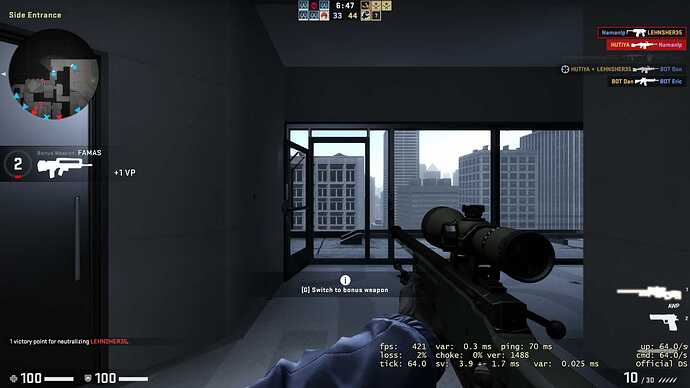Hello
I have installed nvidia-prime to switch overdiscrete video card.When i run prime-run glxgears get 60 FPS same in games.
prime-run glxgears
Running synchronized to the vertical refresh. The framerate should be
approximately the same as the monitor refresh rate.
302 frames in 5.0 seconds = 60.345 FPS
301 frames in 5.0 seconds = 59.990 FPS
301 frames in 5.0 seconds = 60.006 FPS
X connection to :0 broken (explicit kill or server shutdown).
garuda-inxi :
garuda-inxi
System:
Kernel: 5.18.9-zen1-1-zen arch: x86_64 bits: 64 compiler: gcc v: 12.1.0
parameters: BOOT_IMAGE=/@/boot/vmlinuz-linux-zen
root=UUID=249f7653-9c53-4673-b1fb-cfac05f66ac8 rw rootflags=subvol=@
quiet quiet splash rd.udev.log_priority=3 vt.global_cursor_default=0
loglevel=3
Desktop: KDE Plasma v: 5.25.2 tk: Qt v: 5.15.5 info: latte-dock
wm: kwin_x11 vt: 1 dm: SDDM Distro: Garuda Linux base: Arch Linux
Machine:
Type: Laptop System: Dell product: Inspiron 3558 v: N/A
serial: <superuser required> Chassis: type: 9 serial: <superuser required>
Mobo: Dell model: 0G1TDD v: A00 serial: <superuser required> UEFI: Dell
v: A21 date: 07/09/2020
Battery:
ID-1: BAT0 charge: 7.7 Wh (100.0%) condition: 7.7/37.3 Wh (20.6%)
volts: 16.6 min: 14.8 model: Panasonic DELL 78V9D65D type: Li-ion
serial: <filter> status: full
CPU:
Info: model: Intel Core i5-5200U bits: 64 type: MT MCP arch: Broadwell
gen: core 5 built: 2015-18 process: Intel 14nm family: 6
model-id: 0x3D (61) stepping: 4 microcode: 0x2F
Topology: cpus: 1x cores: 2 tpc: 2 threads: 4 smt: enabled cache:
L1: 128 KiB desc: d-2x32 KiB; i-2x32 KiB L2: 512 KiB desc: 2x256 KiB
L3: 3 MiB desc: 1x3 MiB
Speed (MHz): avg: 1730 high: 2614 min/max: 500/2700 scaling:
driver: intel_cpufreq governor: schedutil cores: 1: 1818 2: 2614 3: 1079
4: 1409 bogomips: 17557
Flags: avx avx2 ht lm nx pae sse sse2 sse3 sse4_1 sse4_2 ssse3 vmx
Vulnerabilities:
Type: itlb_multihit status: KVM: VMX disabled
Type: l1tf
mitigation: PTE Inversion; VMX: conditional cache flushes, SMT vulnerable
Type: mds mitigation: Clear CPU buffers; SMT vulnerable
Type: meltdown mitigation: PTI
Type: mmio_stale_data status: Not affected
Type: spec_store_bypass
mitigation: Speculative Store Bypass disabled via prctl
Type: spectre_v1
mitigation: usercopy/swapgs barriers and __user pointer sanitization
Type: spectre_v2 mitigation: Retpolines, IBPB: conditional, IBRS_FW,
STIBP: conditional, RSB filling
Type: srbds mitigation: Microcode
Type: tsx_async_abort status: Not affected
Graphics:
Device-1: Intel HD Graphics 5500 vendor: Dell driver: i915 v: kernel
arch: Gen8 process: Intel 14nm built: 2014-15 ports: active: eDP-1
empty: HDMI-A-1 bus-ID: 00:02.0 chip-ID: 8086:1616 class-ID: 0300
Device-2: NVIDIA GK208BM [GeForce 920M] vendor: Dell driver: nvidia
v: 470.129.06 alternate: nouveau,nvidia_drm non-free: 470.xx+
status: legacy-active (EOL~2023/24) arch: Kepler process: TSMC 28nm
built: 2012-18 pcie: gen: 1 speed: 2.5 GT/s lanes: 4 link-max: gen: 2
speed: 5 GT/s lanes: 8 bus-ID: 08:00.0 chip-ID: 10de:1299 class-ID: 0302
Device-3: Suyin Integrated_Webcam_HD type: USB driver: uvcvideo
bus-ID: 2-5:3 chip-ID: 064e:9209 class-ID: 0e02 serial: <filter>
Display: x11 server: X.Org v: 21.1.3 with: Xwayland v: 22.1.2
compositor: kwin_x11 driver: X: loaded: modesetting,nvidia
alternate: fbdev,intel,nouveau,nv,vesa gpu: i915 display-ID: :0
screens: 1
Screen-1: 0 s-res: 1366x768 s-dpi: 96 s-size: 361x203mm (14.21x7.99")
s-diag: 414mm (16.31")
Monitor-1: eDP-1 model: BOE Display 0x0615 built: 2014 res: 1366x768
hz: 60 dpi: 112 gamma: 1.2 size: 309x173mm (12.17x6.81")
diag: 389mm (15.3") ratio: 16:9, 15:9 modes: 1366x768
OpenGL: renderer: Mesa Intel HD Graphics 5500 (BDW GT2)
v: 4.6 Mesa 22.1.3 direct render: Yes
Audio:
Device-1: Intel Broadwell-U Audio vendor: Dell driver: snd_hda_intel
v: kernel bus-ID: 00:03.0 chip-ID: 8086:160c class-ID: 0403
Device-2: Intel Wildcat Point-LP High Definition Audio vendor: Dell
driver: snd_hda_intel v: kernel bus-ID: 00:1b.0 chip-ID: 8086:9ca0
class-ID: 0403
Device-3: NVIDIA GK208 HDMI/DP Audio driver: snd_hda_intel v: kernel
pcie: gen: 1 speed: 2.5 GT/s lanes: 4 link-max: gen: 2 speed: 5 GT/s
lanes: 8 bus-ID: 08:00.1 chip-ID: 10de:0e0f class-ID: 0403
Sound Server-1: ALSA v: k5.18.9-zen1-1-zen running: yes
Sound Server-2: PulseAudio v: 16.1 running: no
Sound Server-3: PipeWire v: 0.3.54 running: yes
Network:
Device-1: Intel Wireless 3160 driver: iwlwifi v: kernel pcie: gen: 1
speed: 2.5 GT/s lanes: 1 bus-ID: 06:00.0 chip-ID: 8086:08b3 class-ID: 0280
IF: wlp6s0 state: up mac: <filter>
Device-2: Realtek RTL810xE PCI Express Fast Ethernet vendor: Dell
driver: r8169 v: kernel pcie: gen: 1 speed: 2.5 GT/s lanes: 1 port: 4000
bus-ID: 07:00.0 chip-ID: 10ec:8136 class-ID: 0200
IF: enp7s0 state: down mac: <filter>
Bluetooth:
Device-1: Intel Bluetooth wireless interface type: USB driver: btusb v: 0.8
bus-ID: 2-6:4 chip-ID: 8087:07dc class-ID: e001
Report: bt-adapter ID: hci0 rfk-id: 1 state: down
bt-service: enabled,running rfk-block: hardware: no software: yes
address: <filter>
Drives:
Local Storage: total: 465.76 GiB used: 27.9 GiB (6.0%)
SMART Message: Unable to run smartctl. Root privileges required.
ID-1: /dev/sda maj-min: 8:0 vendor: Toshiba model: MQ01ABF050
size: 465.76 GiB block-size: physical: 4096 B logical: 512 B
speed: 6.0 Gb/s type: HDD rpm: 5400 serial: <filter> rev: 2D scheme: GPT
Partition:
ID-1: / raw-size: 465.46 GiB size: 465.46 GiB (100.00%)
used: 27.9 GiB (6.0%) fs: btrfs dev: /dev/sda2 maj-min: 8:2
ID-2: /boot/efi raw-size: 300 MiB size: 299.4 MiB (99.80%)
used: 608 KiB (0.2%) fs: vfat dev: /dev/sda1 maj-min: 8:1
ID-3: /home raw-size: 465.46 GiB size: 465.46 GiB (100.00%)
used: 27.9 GiB (6.0%) fs: btrfs dev: /dev/sda2 maj-min: 8:2
ID-4: /var/log raw-size: 465.46 GiB size: 465.46 GiB (100.00%)
used: 27.9 GiB (6.0%) fs: btrfs dev: /dev/sda2 maj-min: 8:2
ID-5: /var/tmp raw-size: 465.46 GiB size: 465.46 GiB (100.00%)
used: 27.9 GiB (6.0%) fs: btrfs dev: /dev/sda2 maj-min: 8:2
Swap:
Kernel: swappiness: 133 (default 60) cache-pressure: 100 (default)
ID-1: swap-1 type: zram size: 7.67 GiB used: 0 KiB (0.0%) priority: 100
dev: /dev/zram0
Sensors:
System Temperatures: cpu: 58.0 C mobo: 57.0 C
Fan Speeds (RPM): cpu: 2688
Info:
Processes: 219 Uptime: 2h 6m wakeups: 1 Memory: 7.67 GiB
used: 2.37 GiB (30.9%) Init: systemd v: 251 default: graphical
tool: systemctl Compilers: gcc: 12.1.0 Packages: pacman: 1269 lib: 324
Shell: fish v: 3.4.1 default: Bash v: 5.1.16 running-in: konsole
inxi: 3.3.19
Garuda (2.6.4-2):
System install date: 2022-07-07
Last full system update: 2022-07-08
Is partially upgraded: No
Relevant software: NetworkManager
Windows dual boot: Probably (Run as root to verify)
Snapshots: Snapper
Failed units: systemd-backlight@leds:dell::kbd_backlight.service
